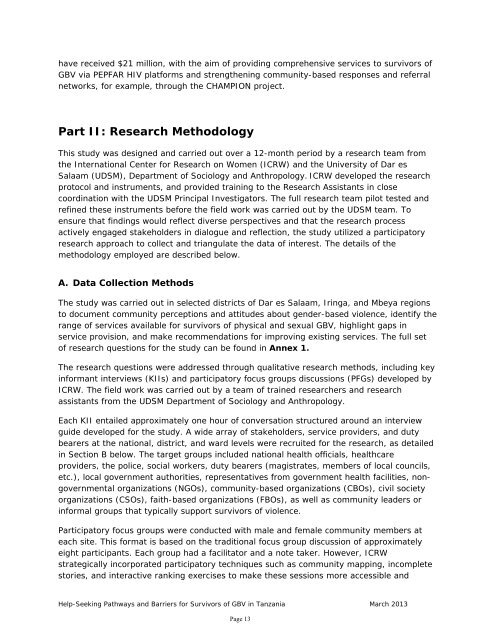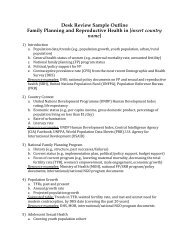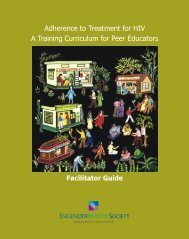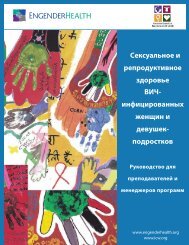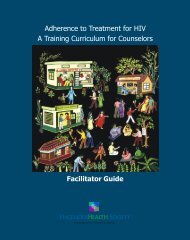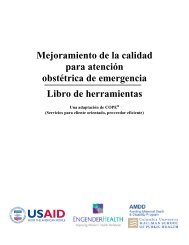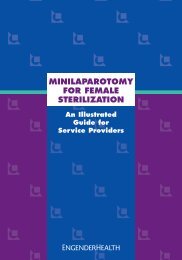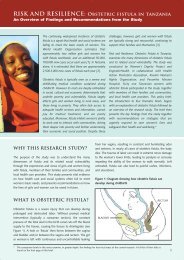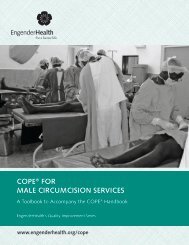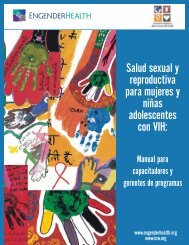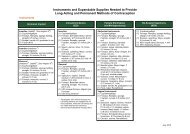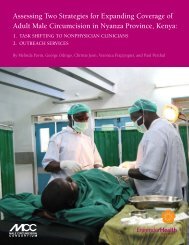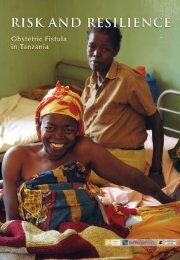Help-Seeking Pathways and Barriers for ... - EngenderHealth
Help-Seeking Pathways and Barriers for ... - EngenderHealth
Help-Seeking Pathways and Barriers for ... - EngenderHealth
Create successful ePaper yourself
Turn your PDF publications into a flip-book with our unique Google optimized e-Paper software.
have received $21 million, with the aim of providing comprehensive services to survivors of<br />
GBV via PEPFAR HIV plat<strong>for</strong>ms <strong>and</strong> strengthening community-based responses <strong>and</strong> referral<br />
networks, <strong>for</strong> example, through the CHAMPION project.<br />
Part II: Research Methodology<br />
This study was designed <strong>and</strong> carried out over a 12-month period by a research team from<br />
the International Center <strong>for</strong> Research on Women (ICRW) <strong>and</strong> the University of Dar es<br />
Salaam (UDSM), Department of Sociology <strong>and</strong> Anthropology. ICRW developed the research<br />
protocol <strong>and</strong> instruments, <strong>and</strong> provided training to the Research Assistants in close<br />
coordination with the UDSM Principal Investigators. The full research team pilot tested <strong>and</strong><br />
refined these instruments be<strong>for</strong>e the field work was carried out by the UDSM team. To<br />
ensure that findings would reflect diverse perspectives <strong>and</strong> that the research process<br />
actively engaged stakeholders in dialogue <strong>and</strong> reflection, the study utilized a participatory<br />
research approach to collect <strong>and</strong> triangulate the data of interest. The details of the<br />
methodology employed are described below.<br />
A. Data Collection Methods<br />
The study was carried out in selected districts of Dar es Salaam, Iringa, <strong>and</strong> Mbeya regions<br />
to document community perceptions <strong>and</strong> attitudes about gender-based violence, identify the<br />
range of services available <strong>for</strong> survivors of physical <strong>and</strong> sexual GBV, highlight gaps in<br />
service provision, <strong>and</strong> make recommendations <strong>for</strong> improving existing services. The full set<br />
of research questions <strong>for</strong> the study can be found in Annex 1.<br />
The research questions were addressed through qualitative research methods, including key<br />
in<strong>for</strong>mant interviews (KIIs) <strong>and</strong> participatory focus groups discussions (PFGs) developed by<br />
ICRW. The field work was carried out by a team of trained researchers <strong>and</strong> research<br />
assistants from the UDSM Department of Sociology <strong>and</strong> Anthropology.<br />
Each KII entailed approximately one hour of conversation structured around an interview<br />
guide developed <strong>for</strong> the study. A wide array of stakeholders, service providers, <strong>and</strong> duty<br />
bearers at the national, district, <strong>and</strong> ward levels were recruited <strong>for</strong> the research, as detailed<br />
in Section B below. The target groups included national health officials, healthcare<br />
providers, the police, social workers, duty bearers (magistrates, members of local councils,<br />
etc.), local government authorities, representatives from government health facilities, nongovernmental<br />
organizations (NGOs), community-based organizations (CBOs), civil society<br />
organizations (CSOs), faith-based organizations (FBOs), as well as community leaders or<br />
in<strong>for</strong>mal groups that typically support survivors of violence.<br />
Participatory focus groups were conducted with male <strong>and</strong> female community members at<br />
each site. This <strong>for</strong>mat is based on the traditional focus group discussion of approximately<br />
eight participants. Each group had a facilitator <strong>and</strong> a note taker. However, ICRW<br />
strategically incorporated participatory techniques such as community mapping, incomplete<br />
stories, <strong>and</strong> interactive ranking exercises to make these sessions more accessible <strong>and</strong><br />
<strong>Help</strong>-<strong>Seeking</strong> <strong>Pathways</strong> <strong>and</strong> <strong>Barriers</strong> <strong>for</strong> Survivors of GBV in Tanzania March 2013<br />
Page 13


